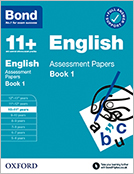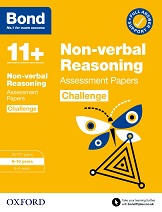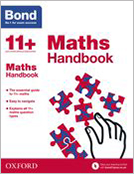Jane Cooney has worked with children and young adults with a wide range of abilities for nearly 20 years. She became a fully-qualified teacher 15 years ago and went on to become Head of Department at a Secondary school in Kent. She now works full-time as a private tutor and has 7 years' experience of helping children prepare for the 11+. She also provides tuition for children from Year 3 to Year 11.
Helping children answer tricky 11+ question types
Many parents find that they are unsure how to tackle particular question types when helping to prepare their child for the 11+. If this sounds familiar, you are not alone in this. I have been an 11+ tutor for over 7 years and have yet to come across a parent who doesn’t think or feel this.
Many of the skills that children need to consolidate are ones that parents may not have used since they themselves were at school. It's the same for everyone, if you don’t practice a skill regularly, you tend to forget how to do it.
If you are supporting your child in an area that you may not be confident in, it would be worth quickly reading the questions and answers before you sit down and assist your child. This will alleviate some of the pressure of having someone beside you waiting for you to help them understand.
Practical advice on answering tricky questions
As a tutor, I have noticed that many of the children I teach find the same types of questions tricky. The following is practical advice on how to tackle these:
English
- Inference
To understand what has been suggested in the text, rather than explicitly mentioned, I encourage children to think of themselves as a ‘detective’ and search for clues. - Vocabulary
Look for root words in longer words that they are unfamiliar with (e.g. ‘accept’ is the root word of ‘unacceptable’). Encourage your child to use a dictionary as much as possible to do this, as they will become familiar with a wider range of vocabulary more quickly. This, in turn, will also help with spelling.
Maths
- Word Problems
The key here is to read the question once to get an idea of what it is about, then read it again (or even two or three more times) and start picking out the information needed. Once they have completed the question, get them to read it again to check they have completed everything they need to.
Reasoning
Children may find Verbal Reasoning and Non-verbal Reasoning questions a little strange at first as they are not taught as part of the National Curriculum. As a result, they need to familiarise themselves with the variety of question types in both areas. I have found that children tend to enjoy these most of all in their 11+ preparation, as it doesn’t feel like a school subject and they are more like puzzles!
Verbal Reasoning
- Knowledge of homophones and homonyms
Homophones are words that have the same pronunciation, but a different spelling and meaning (e.g. to, too and two). Homonyms are words that have the same pronunciation and spelling, but a different meaning (e.g. ‘bark’ can describe the sound a dog makes or the outer layer of a tree). Write examples of these words on separate pieces of paper and put them in an envelope. Your child can then pick one out and explain its meaning to you. Children tend to enjoy this as it becomes a game where they try and beat their best score.
Non-verbal Reasoning
- Answering in enough time
Use a timer on a mobile phone or even an egg timer. Gradually reduce the time given for questions as your child becomes more confident. Bond’s 10 Minute Tests are a great tool in helping to address this. - Nets
This is one of the questions children tend to find most tricky. To overcome this, get them to copy the nets shown in their workbooks and assemble them – they will then be able to see how some nets work and others do not.
You can find further practical tips and answer support throughout Bond’s range of books and resources. Bond 11+ Assessment Papers, Bond 11+ Challenge Assessment Papers and 11+ Handbooks are particularly helpful in providing support with tricky questions and are a valuable tool in supporting your child not only to understand the content, but the questions themselves. By using the detailed explanations of how each answer is achieved, you will be able to quickly and easily guide your child in answering questions confidently.
Jane Cooney
Connect with Jane on LinkedIn: www.linkedin.com/in/jane-cooney-sevenoaks-tutor
Visit Jane's Website: https://www.janecooneysevenoakstutor.com/
Recommended resources
Bond 11+ Assessment Papers
Topic-based practice questions that set the foundation for success. These carefully-graded practice papers provide essential practice for each question type in a realistic exam style. Ages 5-13+
Now with fully explained answers (for ages 9-11)
Bond 11+ Challenge Assessment Papers
Challenging practice questions for rigorous 11+ preparation. New editions contain new 'extra tricky' questions, as well as fully explained answers in the pull-out centre section. Ages 8-11
Now with fully explained answers (for ages 9-11)
Bond 11+ Handbooks
Bond's ultimate 'how to' guides for each 11+ subject. With clear explanations and comprehensive worked examples of all 11+ question types to help children pass the 11+ exam.
Practical support for parents and children aged 8-11
More from Bond
- Nets of Cubes: Practice assembling nets with our free download. Note that you will need to log in to your Bond account.
- The 11+ Exam: A Parent's Guide: Covering everything you need to know ahead of the tests, download your free guide.
- Watch our How To videos: From comprehension to probability, word-code-wode problems to nets of cubes, 11+ tutor Alvon Stewart shows you how to help your child at home with these tough skills.
- Developing exam skills at home: Discover our top tips for helping your child develop their exam skills at home on the Bond blog.



